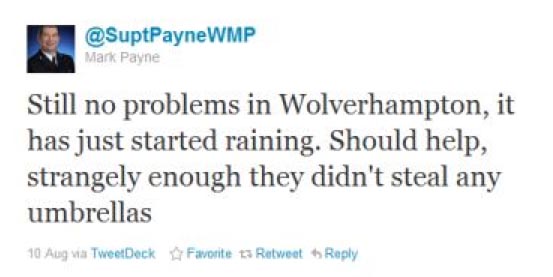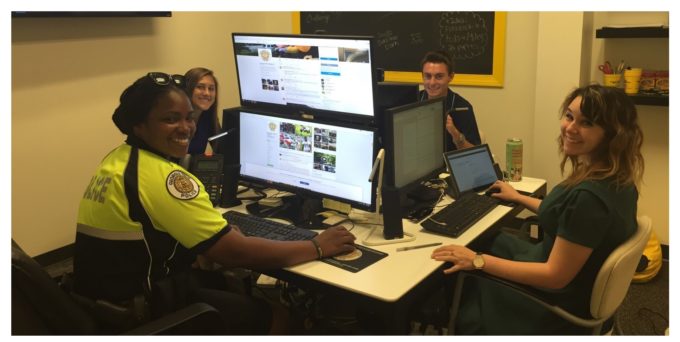How bloggers and police countered riot rumours in Wolverhampton

This is a follow-up to a post I wrote about the riots a few days ago – where I tried to highlight some of the good things to come from the use of social media at the time. One of the examples I cited was Superintendent Mark Payne‘s tweeting to counter the wildly inaccurate rumours about what was happening in Wolverhampton. As commenters on the post pointed out (including Mel Potter of Wolverhampton City Council), the WV11 blog (which, as it happens, we’d highlighted in a report commissioned by Wolverhampton City Council and West Midlands Police as a great example of civic use of social media) had been using its Facebook page to also battle against the misinformation. There have been calls from some politicians and a few police to suspend Twitter and Facebook during similar events in the future, in the belief that this would stop rumours that end up wasting police time from quickly spreading. So I’m hoping this is a timely piece – even if it is a very long one!!! Monday 8th of August, 2011 Following riots over the weekend in London, there were reports of trouble spreading to other cities across England on Monday including nearby Birmingham. In Wolverhampton, at this time Mark Payne said that nothing was happening – despite many rumours to the contrary. If you look at his Twitter stream from that day, you can see what he did to counter these rumours. He took time to carefully answer questions and clear up some of the confusion, as well as reporting from other officers around the West Midlands.  At the same time, Steph from the WV11 blog told us that she was seeing similar rumours circulating on Facebook. That evening, she and partner James started to update their Facebook page to set people straight:-
At the same time, Steph from the WV11 blog told us that she was seeing similar rumours circulating on Facebook. That evening, she and partner James started to update their Facebook page to set people straight:-  Tuesday 9th of August, 2011 On Tuesday morning, Mark tweeted that there was some minor damage to shops in Wolves overnight, but this was nothing in comparison to the problems elsewhere. At middday, he tweeted: “Huge amount of resources available to quell any trouble in Wolverhampton and the West Mids. Hope common sense prevails.” Later that day, Mark was on the ground when trouble did flare up: “I was in amongst the rioters five minutes before it kicked off,” he told me. “And I was able to use twitter to tell people what was actually happening – and what wasn’t.” Mark said, too, that he knew when and why there would be trouble. “I know a lot of the criminals [in Wolverhampton] and I saw people in amongst that crowd who were criminals. It was clear that was where the disorder was coming from,” he said. “It became really hostile and really volatile, really quickly.”
Tuesday 9th of August, 2011 On Tuesday morning, Mark tweeted that there was some minor damage to shops in Wolves overnight, but this was nothing in comparison to the problems elsewhere. At middday, he tweeted: “Huge amount of resources available to quell any trouble in Wolverhampton and the West Mids. Hope common sense prevails.” Later that day, Mark was on the ground when trouble did flare up: “I was in amongst the rioters five minutes before it kicked off,” he told me. “And I was able to use twitter to tell people what was actually happening – and what wasn’t.” Mark said, too, that he knew when and why there would be trouble. “I know a lot of the criminals [in Wolverhampton] and I saw people in amongst that crowd who were criminals. It was clear that was where the disorder was coming from,” he said. “It became really hostile and really volatile, really quickly.”  Because Mark’s updates were coming from a verifiable, official source they proved helpful to other people in Wolverhampton trying to make sense of what was going on. Steph Jennings of the WV11 blog said: “When we set up WV11 we made a decision that we’d only ever report things if we knew were fact, so getting updates from Mark and other police officers was really valuable.” Steph and James relayed Mark’s updates regularly to their Facebook page and blog – pouring cold water on myths that there had disturbances at the Bentley Bridge shopping centre in Wednesfield (which, by the way, is WV11). The work they did appears to have had an invaluable effect. “After a while, people were coming onto the Facebook page and correcting what other people were saying [when they were rumours]. People were saying things like: ‘I think you should just listen to what the guys running the site are saying.'” Of course, Mark’s tweets weren’t just being followed by the WV11 blog – but by more traditional news sources, too. At one point, Mark says, the content of an update found its way on to Sky News – perhaps more proof if it was needed of the value and timeliness of the information he was providing. Wednesday 10th of August, 2011 On the day following the trouble, both Mark and WV11 were quick to report on the aftermath – both the damage to shops and the efforts to clean up the centre. Mark also made sure people knew about what the police had done to track down the troublemakers. WV11 posted photographs in the afternoon – showing how people were out on the streets tidying up. They took care, Steph said, to not just capture shops that were damaged, but those that were not. “We took the photos to help to stop the rumours,” Steph said. “That’s one thing about WV11. It’s always been about saying: ‘It’s not all bad, despite what some people think.'”
Because Mark’s updates were coming from a verifiable, official source they proved helpful to other people in Wolverhampton trying to make sense of what was going on. Steph Jennings of the WV11 blog said: “When we set up WV11 we made a decision that we’d only ever report things if we knew were fact, so getting updates from Mark and other police officers was really valuable.” Steph and James relayed Mark’s updates regularly to their Facebook page and blog – pouring cold water on myths that there had disturbances at the Bentley Bridge shopping centre in Wednesfield (which, by the way, is WV11). The work they did appears to have had an invaluable effect. “After a while, people were coming onto the Facebook page and correcting what other people were saying [when they were rumours]. People were saying things like: ‘I think you should just listen to what the guys running the site are saying.'” Of course, Mark’s tweets weren’t just being followed by the WV11 blog – but by more traditional news sources, too. At one point, Mark says, the content of an update found its way on to Sky News – perhaps more proof if it was needed of the value and timeliness of the information he was providing. Wednesday 10th of August, 2011 On the day following the trouble, both Mark and WV11 were quick to report on the aftermath – both the damage to shops and the efforts to clean up the centre. Mark also made sure people knew about what the police had done to track down the troublemakers. WV11 posted photographs in the afternoon – showing how people were out on the streets tidying up. They took care, Steph said, to not just capture shops that were damaged, but those that were not. “We took the photos to help to stop the rumours,” Steph said. “That’s one thing about WV11. It’s always been about saying: ‘It’s not all bad, despite what some people think.'”  The ill-founded rumours on Twitter and Facebook continued on the Wednesday, but claims there’d be more trouble never materialised. Mark even cracked a joke about it, as you can see below…
The ill-founded rumours on Twitter and Facebook continued on the Wednesday, but claims there’d be more trouble never materialised. Mark even cracked a joke about it, as you can see below…  What’s happened since Both WV11, Mark and others at West Midlands Police continued their work that night and for the next few days. Mark, who has emphasised time and again the really hard work officers on the ground did during the disorder, evidently feels that Twitter had a positive impact as well. But he points out that it takes time to build your authority in social m
What’s happened since Both WV11, Mark and others at West Midlands Police continued their work that night and for the next few days. Mark, who has emphasised time and again the really hard work officers on the ground did during the disorder, evidently feels that Twitter had a positive impact as well. But he points out that it takes time to build your authority in social m
edia – and other constabularies won’t get instant results. “You can’t just pop up from the ground and expect people to trust what you say, because for them there is no point of reference,” he said. “It’s because I’ve used [Twitter] for three or four years and people know who I am and they’ve seen me tweet from policing events before.” Mark is now followed by more than 7,000 people on Twitter – greater in number than some police forces enjoy. He told me it is a ‘vital tool for modern policing’. “Given the level of interest you try and try to use this well. Wherever I go I find that people love the police. This is an absolutely open goal.” Update: You can now read Mark’s thoughts about all of this on his blog here. The WV11 blog has also enjoyed a huge surge in interest as a result of its work during the riots. Steph said: “We want to capitalise on it while we can. Of course we know we can’t hope to sustain the levels we’ve seen but it’s an opportunity to start to engage with more people.” The blog has been talking to the police about a regular blog post from a police officer being published on the site – and Steph and James have already provided a live blog from a PACT meeting. So what does all this mean? Steph and James love where they live – that’s why they do what they do. So – quite evidently – does Mark. It’s natural that they should work together, indeed it’s a principle enshrined in the way this country has always been policed. Using social media can evidently help these kinds of relationships to blossom quickly and at times without any (or very much) formal management. Of course, these same advantages can be used for bad – but the vast majority of people are more like Steph, James and Mark than they are like the looters – as a few minutes spent looking at the WV11 Facebook Page will prove. Both the guys from WV11 and Mark Payne agree that it’s important for the police and government to make better use of social networking tools. I hope their experiences will convince a few more people to take the plunge.
You can read another version of this piece over at the Public-i blog here.
 Andrew is the online communities manager for Public-i, helping public organisations, including police forces, with social media and community management. For more than eight years before that he was a journalist – in London and then in Dubai. More recently he has worked with Podnosh.com back in the UK, and studied online journalism at Birmingham City University. You can read more about Andrew’s work over at Public-i’s blog.
Andrew is the online communities manager for Public-i, helping public organisations, including police forces, with social media and community management. For more than eight years before that he was a journalist – in London and then in Dubai. More recently he has worked with Podnosh.com back in the UK, and studied online journalism at Birmingham City University. You can read more about Andrew’s work over at Public-i’s blog.


